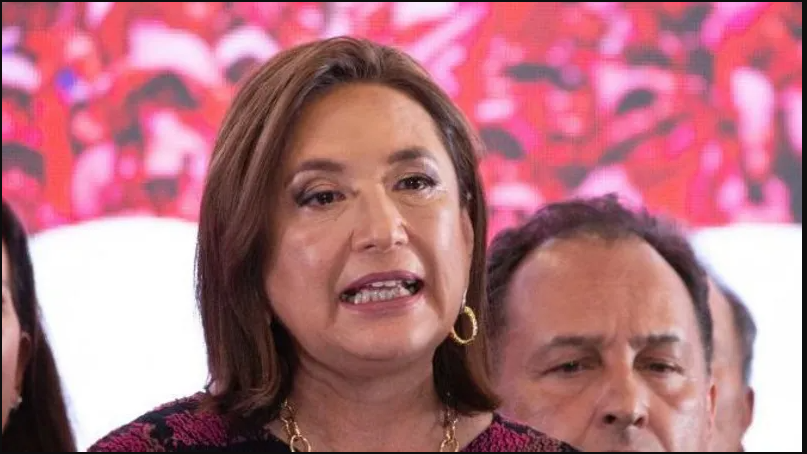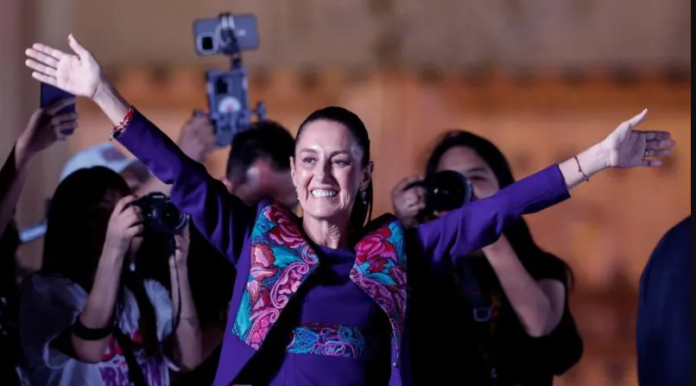Mexico beats neighbour America to elect first female President in historic vote
By Jeph Ajobaju, Chief Copy Editor
Mexico this morning elected Claudia Sheinbaum its first ever female President, beating its neighbour the United States to the historic choice, after the electoral body said preliminary results showed her getting between 58 per cent and 60 per cent of the votes in the ballot on Sunday.
Sheinbaum, 61, a former Mayor of Mexico City, led by about 30 percentage points over her main rival Xóchitl Gálvez, a businesswoman, according to reporting by the BBC.
Ms Sheinbaum will replace her mentor, outgoing President Andrés Manuel López Obrador, on 1 October – 71 years after women were allowed to vote in the South American nation.
Ms Sheinbaum, a former energy scientist, has promised continuity, saying that she will continue to build on the “advances” made by Mr López Obrador, further building on the welfare programmes which have made the outgoing president very popular.
But in her victory speech she also highlighted what has set this Mexican election apart from previous ones. She told cheering voters: “For the first time in the 200 years of the [Mexican] Republic, I will become the first woman president of Mexico.”
She said it was an achievement not just for her but for all women.
“I’ve said it from the start, this is not just about me getting [to the top office], it’s about all of us getting here.”
She added: “I won’t fail you.”
Ms Sheinbaum also thanked her rival, Xóchitl Gálvez, who has conceded victory.
Prior to running for president, Ms Sheinbaum was mayor of Mexico City, one of the most influential political positions in the country and one that is seen as paving the way for the presidency.
Ms Sheinbaum, whose Jewish maternal grandparents immigrated to Mexico from Bulgaria fleeing the Nazis, had an illustrious career as a scientist before delving into politics. Her paternal grandparents hailed from Lithuania.
Both of her parents were scientists and Ms Sheinbaum studied physics before going on to receive a doctorate in energy engineering.
She spent years at a renowned research lab in California studying Mexican energy consumption patterns and became an expert on climate change.
That experience and her student activism eventually earned her the position of secretary of the environment for Mexico City at the time when Andrés Manuel López Obrador was mayor of the capital.
In 2018 she became the first female mayor of Mexico City, a post she held until 2023, when she stepped down to run for president.
The election, which pitted Ms Sheinbaum against Ms Gálvez, has been described as a sea change for women in Mexico.
Edelmira Montiel, 87, said that she was grateful to be alive to see a woman elected to the top office.
“Before, we couldn’t even vote, and when you could, it was to vote for the person your husband told you to vote for. Thank God that has changed and I get to live it,” she told Reuters, referring to the fact that women were only allowed to vote in national elections in 1953.
While the fact that the two front-runners were women was widely celebrated, the campaign was marred by violent attacks.
As well as a new president, voters were also electing all members of Mexico’s Congress and governors in eight states, the head of Mexico City’s government, and thousands of local officials.
And it was local candidates in particular who were targeted in the run-up to the vote.
The government says more than 20 were killed across Mexico, although other surveys put the total at 37.
Ms Gálvez harshly criticised the government and her rival in the presidential race for the violence which blights large parts of Mexico.
She promised to be “the bravest president, a president who does confront crime” if elected, but failed to provide many details about how she would tackle the powerful criminal cartels which are behind much of the violence.
After Ms Sheinbaum’s lead became unassailable, Ms Gálvez called her.
“I told her I saw a Mexico with a lot of pain and violence. I wished that she could solve the severe problems our people have,” Ms Gálvez said of the call.
How to tackle Mexico’s violent cartels is going to be one of the many challenges facing Ms Sheinbaum when she takes up office.
She has said that it is important to tackle what she says are the roots of the violence and has promised to invest in welfare programmes to prevent poor young Mexicans from being recruited by criminal groups.
On relations with Mexico’s northern neighbour, the United States, which at times have been testy under her predecessor in office, she said she would ensure there would be “a relationship of friendship, mutual respect and equality”.
But in a reference to the many Mexicans living and working in the US, she promised to “always defend the Mexicans who are on the other side of the border”.
Relations between the US and Mexico suffered under Mr López Obrador, who has been in power since 2018.
The outspoken leader was barred from running for a second term under Mexico’s constitution, which limits presidents to a single six-year-term.
He threw his weight behind Ms Sheinbaum instead.
Having the backing of the popular president, who has an approval rate of close to 60%, gave Ms Sheinbaum’s campaign a huge boost.
Many of those voting for her said they backed Morena’s programme to alleviate poverty and wanted to see it continued.

_Gálvez has conceded defeat
_________________________________________________________________
Related articles:
Japan Airlines’ former flight attendant becomes its first female President
Nigeria’s gender equality better than global average, says IFC
Man beheads wife for failing to make morning tea in time
Computer error misleads airline to treat woman aged 101 as an infant
__________________________________________________________________













